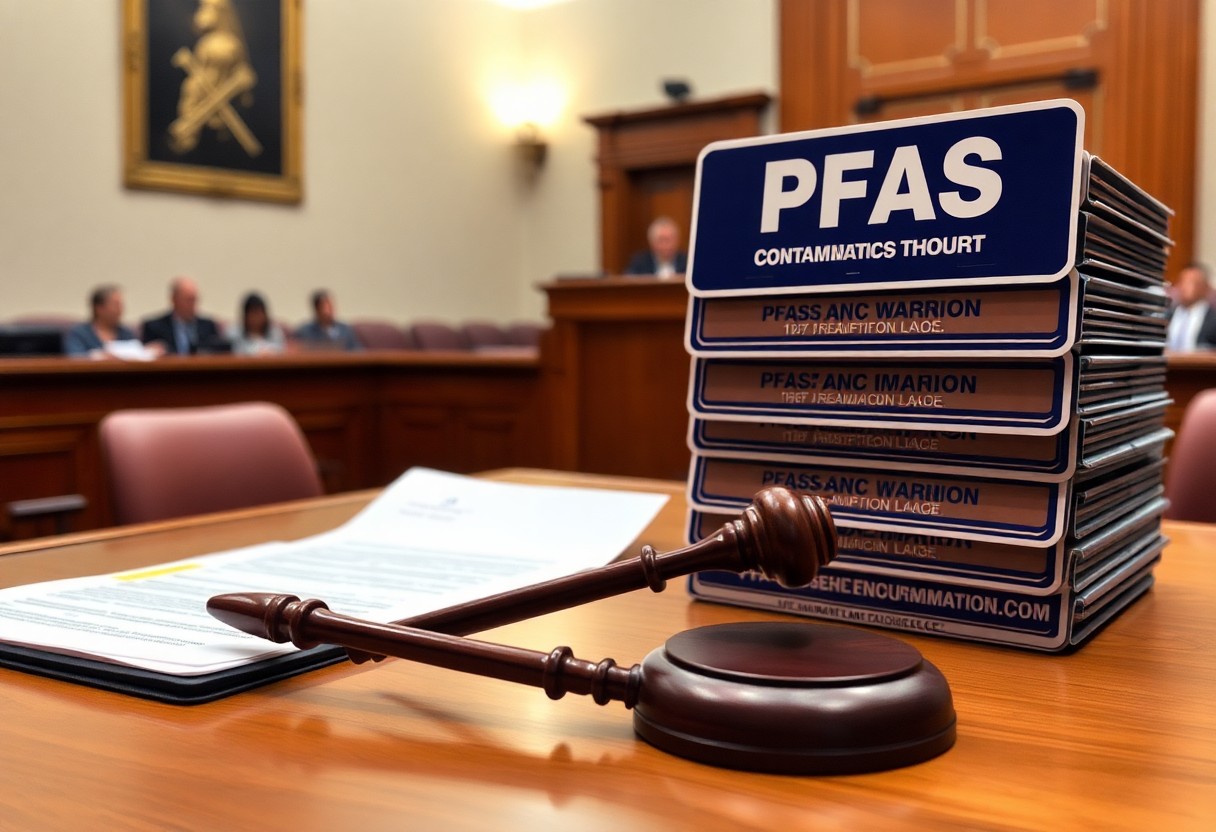Success in pursuing personal injury claims related to PFAS lawsuits starts with understanding the specific legal landscape surrounding these cases. You need to gather relevant evidence, establish a connection between your injuries and PFAS exposure, and navigate the complexities of medical documentation. By following a structured approach, you can enhance your chances of obtaining the compensation you deserve. This blog will guide you through each step to ensure your claim is solid and well-prepared for legal proceedings.
Understanding PFAS and Their Impact
The prevalence of per- and polyfluoroalkyl substances (PFAS) in everyday products raises concerns about their potential adverse effects on human health and the environment. As you navigate personal injury claims related to PFAS exposure, understanding these substances and their consequences is necessary for achieving a successful outcome.
What Are PFAS?
To clarify, PFAS are a group of synthetic chemicals widely used for their water- and grease-resistant properties. Commonly found in items like non-stick cookware, water-repellent clothing, and various industrial applications, these substances have become ubiquitous in our environment.
Health Risks Associated with PFAS Exposure
Before pursuing a personal injury claim, it is important to be aware of the potential health risks tied to PFAS exposure. Research indicates that prolonged exposure can lead to various health issues, including liver damage, thyroid problems, decreased fertility, and increased risk of certain cancers.
The link between PFAS exposure and health concerns underscores the importance of addressing this issue seriously. Scientific studies suggest that these chemicals can disrupt hormonal systems and contribute to immunotoxic effects, which may leave you vulnerable to infections and other health problems. Understanding the risks empowers you to take informed action regarding your health and potential claims.
The Legal Framework for Personal Injury Claims
Some personal injury claims related to PFAS lawsuits are governed by a complex legal framework that integrates both federal and state regulations. You need to understand how these laws interact and impact your case, as they dictate how your claim will progress, the evidence required, and the potential damages you may recover. Awareness of the legal nuances is vital to successfully navigating the claims process.
Federal and State Regulations on PFAS
Between federal guidelines and state-specific regulations, there is a nuanced landscape governing PFAS exposure and its effects on public health. Awareness of these regulations is imperative as they will inform the legal strategies in your personal injury claim. Each state may have different standards regarding PFAS limits and disclosures, which can directly impact your case.
Establishing Liability in PFAS Cases
Any personal injury claim you pursue related to PFAS exposure must establish liability, meaning you must prove that a specific party is responsible for your harm. This requires demonstrating that your exposure resulted from the negligent actions of a manufacturer, facility, or another entity that failed to appropriately manage or disclose PFAS risks.
Plus, establishing liability in PFAS cases often involves gathering substantial evidence, including documentation of exposure levels, medical records that link health issues to PFAS, and expert testimonies regarding the harmful effects of these substances. You may also need to show that the responsible party knew about the risks and failed to take adequate measures to protect you from exposure. It’s imperative to work closely with legal professionals who have experience in environmental litigation to build a strong case.
Gathering Evidence for Your Claim
Assuming you are pursuing a personal injury claim related to PFAS exposure, gathering evidence is a vital step in building a strong case. You’ll need to compile various forms of documentation that support your claims, including medical records, eyewitness accounts, and environmental data. This evidence will help substantiate your exposure history and the health effects you’ve experienced, making it important to approach this step with thoroughness and attention to detail.
Medical Records and Diagnoses
Medical records play a significant role in your claim, as they provide detailed documentation of your health condition and any diagnoses related to PFAS exposure. Ensure you request and maintain accurate and complete medical records from healthcare professionals who have treated you. These records will serve as critical evidence when establishing the link between your health issues and PFAS exposure.
Documenting Exposure History
Your exposure history is equally important to establish in your claim. You should document any possible contact with PFAS, including the places you lived or worked, as well as any specific products you used that may have contained these chemicals.
Consequently, maintaining a detailed chronology of your exposure can significantly enhance your claim’s credibility. Start by noting dates, locations, and circumstances surrounding the exposure. If possible, gather testimonies from witnesses and other affected individuals, and collect any relevant environmental reports or studies that correlate PFAS presence in your area. This comprehensive documentation will strengthen your argument and support your case effectively.

Steps to File a Personal Injury Lawsuit
After you have decided to pursue a personal injury claim, it is crucial to follow a clear process to file your lawsuit effectively. This involves gathering evidence, consulting legal professionals, and meeting specific deadlines, all of which will increase your chances of a successful outcome in your PFAS lawsuit case.
Initial Consultation with a Lawyer
With your situation at hand, the first step is to arrange an initial consultation with a qualified attorney who specializes in personal injury claims. This meeting provides an opportunity for you to discuss the details of your case, assess the strength of your claim, and understand your legal rights moving forward.
Filing the Claim and Necessary Documentation
File your claim promptly and prepare all necessary documentation to support your case. This includes medical records, proof of lost wages, and any evidence linking your injuries to PFAS exposure. Having all pertinent documents ready will streamline the litigation process and bolster your case.
Indeed, the process of filing a claim typically requires meticulous attention to detail. You’ll need to ensure that all your medical documentation accurately reflects your condition and treatment, alongside any other relevant bills or financial losses incurred due to the injury. The strength of your claim relies heavily on the evidence you provide, so compiling thoroughly researched and organized documentation is vital in establishing causation between PFAS exposure and your injuries.
Legal Strategies in PFAS Lawsuits
Once again, pursuing a personal injury claim in PFAS lawsuits requires a strategic approach. You will need to gather solid evidence linking your health issues to PFAS exposure, which may involve detailed medical records, expert testimonies, and documentation of the source of contamination. Engaging experienced legal counsel skilled in these specialized areas can significantly enhance the likelihood of a successful outcome.
Class Action vs. Individual Lawsuits
To decide between a class action and an individual lawsuit, you must consider the specifics of your case. Class actions are suitable if you and many others have similar claims against a single defendant, simplifying the process and sharing costs. Individual lawsuits may offer greater control and potentially higher compensation but require more resources and individualized legal strategy.
Potential Defenses Against Claims
Against your claim, defendants in PFAS lawsuits may assert various defenses, such as disputing causation or minimizing the extent of exposure. They could claim that the plaintiff failed to mitigate damages or that other environmental or lifestyle factors contributed to your health issues. These defenses can complicate your case, emphasizing the need for robust evidence.
With these potential defenses, it’s vital to prepare your strategy thoroughly. You should anticipate challenges such as establishing a clear link between PFAS exposure and specific health conditions. Gathering expert testimonies, scientific studies, and comprehensive medical documentation can help counter these defenses effectively. By being proactive in your preparation, you strengthen your position against these common arguments and increase your chances of success in your lawsuit.
Navigating the Claims Process
Keep a detailed record of your medical treatments, expenses, and any communication with your insurance provider, as this documentation will support your claim. Understanding the claims process is vital, and working closely with an attorney experienced in PFAS lawsuits can help streamline efforts. By staying organized and aware of the specific requirements for filing your claim, you can enhance your chances of a successful outcome.
The Role of Negotiation and Settlement
Before you proceed to trial, it’s vital to engage in negotiations with the opposing party. Settlements can save time, reduce stress, and potentially yield a satisfactory compensation amount. Your attorney will help determine the best course of action during these discussions to ensure you are not settling for less than what you deserve.
Preparing for Trial
On the other hand, if negotiations do not lead to a favorable outcome, you must be prepared to take your case to trial. This involves gathering evidence, interviewing witnesses, and developing a solid strategy that aligns with your goals. Being well-prepared is vital to bolster your case and advocate for your rights effectively.
Consequently, dedicating time and effort to preparing for trial can significantly impact your case’s outcome. This phase demands thorough research and collaboration with your legal team, who will guide you through the complexities of courtroom procedures. Ensure you are familiar with the timeline, the intricacies of presenting evidence, and eloquently articulating your story. By strategically preparing, you can enter the trial with confidence, increasing your chances of securing a fair verdict in your favor.

To Wrap Up
Ultimately, navigating personal injury claims in PFAS lawsuit cases requires a clear understanding of the legal landscape and an organized approach to gathering evidence, preparing documentation, and working with experienced legal counsel. By diligently following the outlined steps, you can enhance your chances of achieving a favorable outcome, ensuring that your rights are upheld and that you receive the compensation you deserve for the effects of PFAS exposure. Stay informed and proactive throughout the process, as your advocacy is key in seeking justice.

















